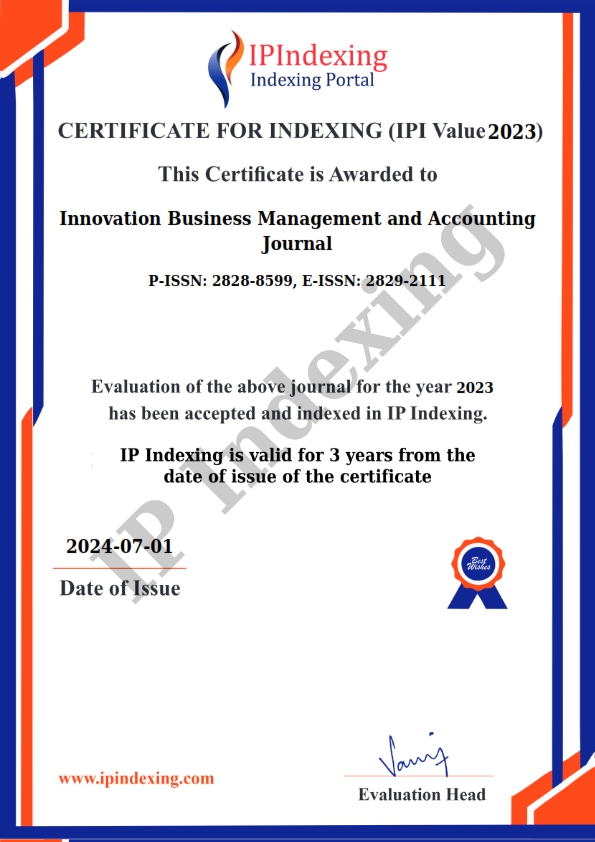Analysis of the Application of Circular Economy Concepts in Coffee Shop Business
DOI:
https://doi.org/10.56070/ibmaj.2025.032Keywords:
Circular Economy, Coffee Shop, Sustainability, Waste ManagementAbstract
This research aims to analyze the application of circular economy principles in the coffee shop business as a step towards creating a sustainable business model. The concept of circular economy focuses on resource optimization by applying the 3R principles (Reduce, Reuse, Recycle) and reducing dependence on limited natural resources. The approach used in this research is descriptive qualitative, through case studies in several coffee shops that have adopted environmentally friendly practices, such as the utilization of recycled materials, processing coffee waste, and reducing the use of single-use plastics. Data collection was conducted through in-depth interviews, direct observation, and documentation tasks. The findings from this study show that implementing a circular economy can improve operational efficiency, create a positive image in the eyes of consumers, and provide both economic and environmental benefits. Although there are some challenges, such as high start-up costs and a lack of business and consumer awareness, the strategy is considered to have the potential to be implemented more widely. The hope of this research is to contribute to small and medium enterprises in developing businesses that are not only financially profitable, but also contribute to environmental conservation.
Downloads
References
Direktorat Jenderal Pengelolaan Sampah Limbah dan Bahan Beracun Berbahaya. (2019). Statiska 2019. Dinas Lingkungan Hidup Dan Kehutanan, 16.
Harahap, L., & Dwiningsih, N. (2022). Pengenalan Ekonomi Sirkular (circular economy) bagi masyarakat umum. Empowerment: Jurnal Pengabdian Masyarakat, 1(2), 135–141.
Latifah, E., & Abdullah, R. (2024). Prespektif Maqashid Syariah : Peran Ekonomi Hijau Dan Biru Dalam Mewujudkan Sustainable Development Goals. JISEF : Journal Of International Sharia Economics And Financial, 2(1), 1–22. https://doi.org/10.62668/jisef.v2i01.1128
Perlindungan Dan Pengelolaan Lingkungan Hidup, K. (2009). Undang-Undang Republik Indonesia Nomor 32 Tahun 2009. Экономика Региона, Kolisch 1996, 49–56.
Rany, A. P., Farhani, S. A., Nurina, V. R., & Pimada, L. M. (2020). Tantangan Indonesia dalam mewujudkan pertumbuhan ekonomi yang kuat dan pembangunan ekonomi berkelanjutan melalui indonesia green growth program oleh BAPPENAS. Jiep, 20(1), 63–73.
Ridwan, I. R. (2016). Dampak Industri Terhadap Lingkungan Dan Sosial. Jurnal Geografi Gea, 7(2). https://doi.org/10.17509/gea.v7i2.1716
Rijali, A. (2019). Analisis Data Kualitatif. Alhadharah: Jurnal Ilmu Dakwah, 17(33), 81. https://doi.org/10.18592/alhadharah.v17i33.2374
Sari, I. G. A. W., & Setiawan, P. Y. (2017). Pengaruh Green Marketing Dan Packaging Terhadap Brand Image Dan Loyalitas Pelanggan Pada Konsumen Starbucks Coffee. E-Jurnal Manajemen Universitas Udayana, 6(7), 250817.
Suparyanto dan Rosad (2015. (2020). Metode Penelitian Pendidikan. Suparyanto Dan Rosad, 5(3), 248–253.
Susilo, R. F. N., Darmawan, A. J., & Putri, Y. H. (2023). Konsep Ekonomi Sirkular Dalam Model Bisnis Berkelanjutan Untuk Membangun Gaya Hidup Hijau Masyarakat Indonesia. Jurnal IMAGINE, 3(1), 2776–9836. https://doi.org/10.35886/imagine.v3i1.520
Walhi. (2015). Ekonomi nusantara : tawaran solusi pulihkan indonesia.
Downloads
Published
How to Cite
Issue
Section
License
Copyright (c) 2025 Muhammad Rafli, Asiroch Yulia Agustina, Nur Khayin Muhdlor

This work is licensed under a Creative Commons Attribution-ShareAlike 4.0 International License.



